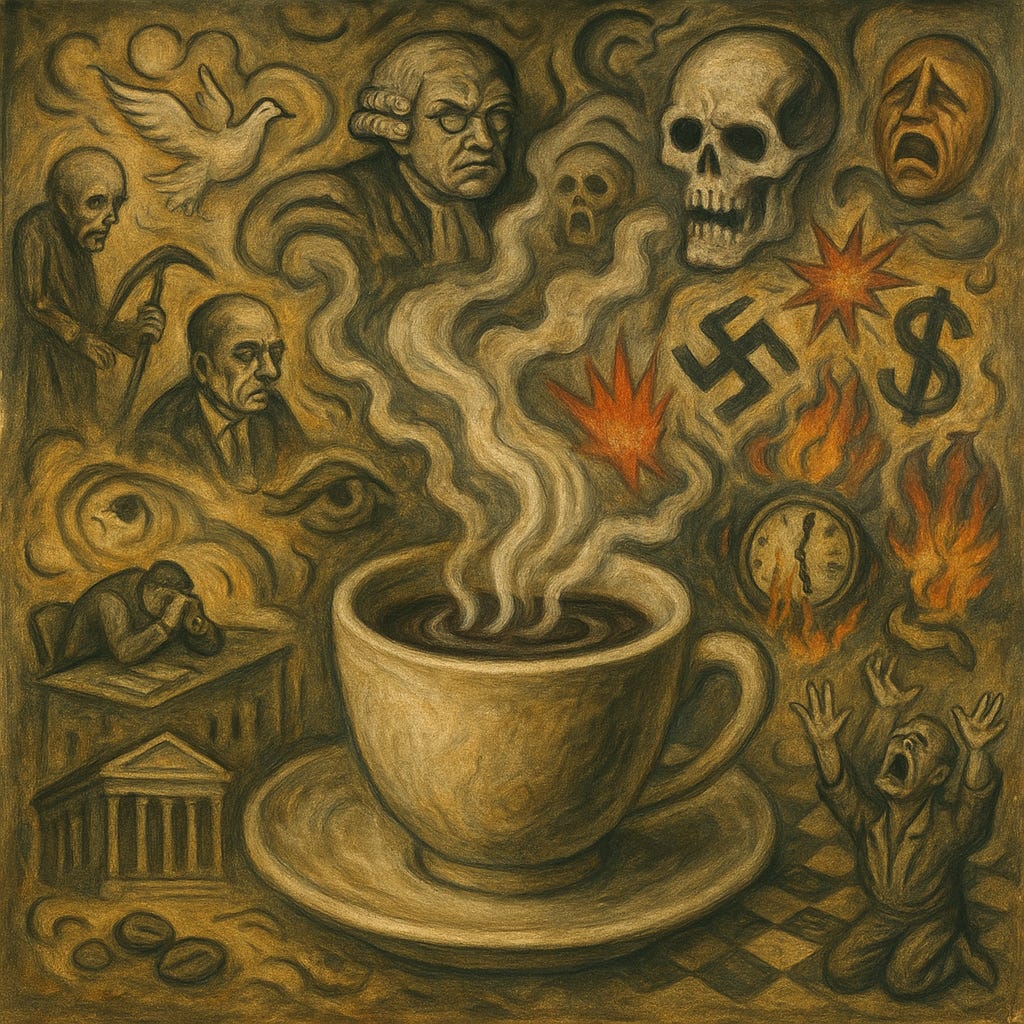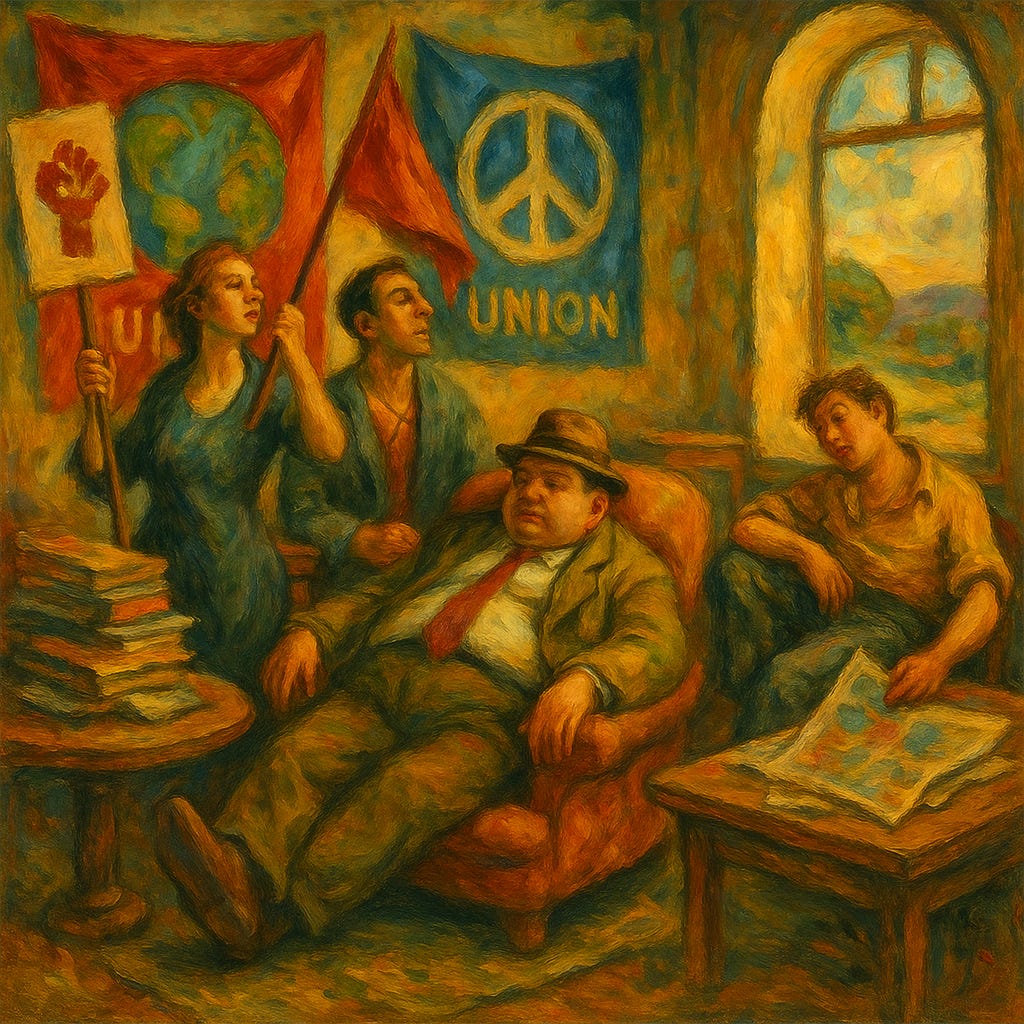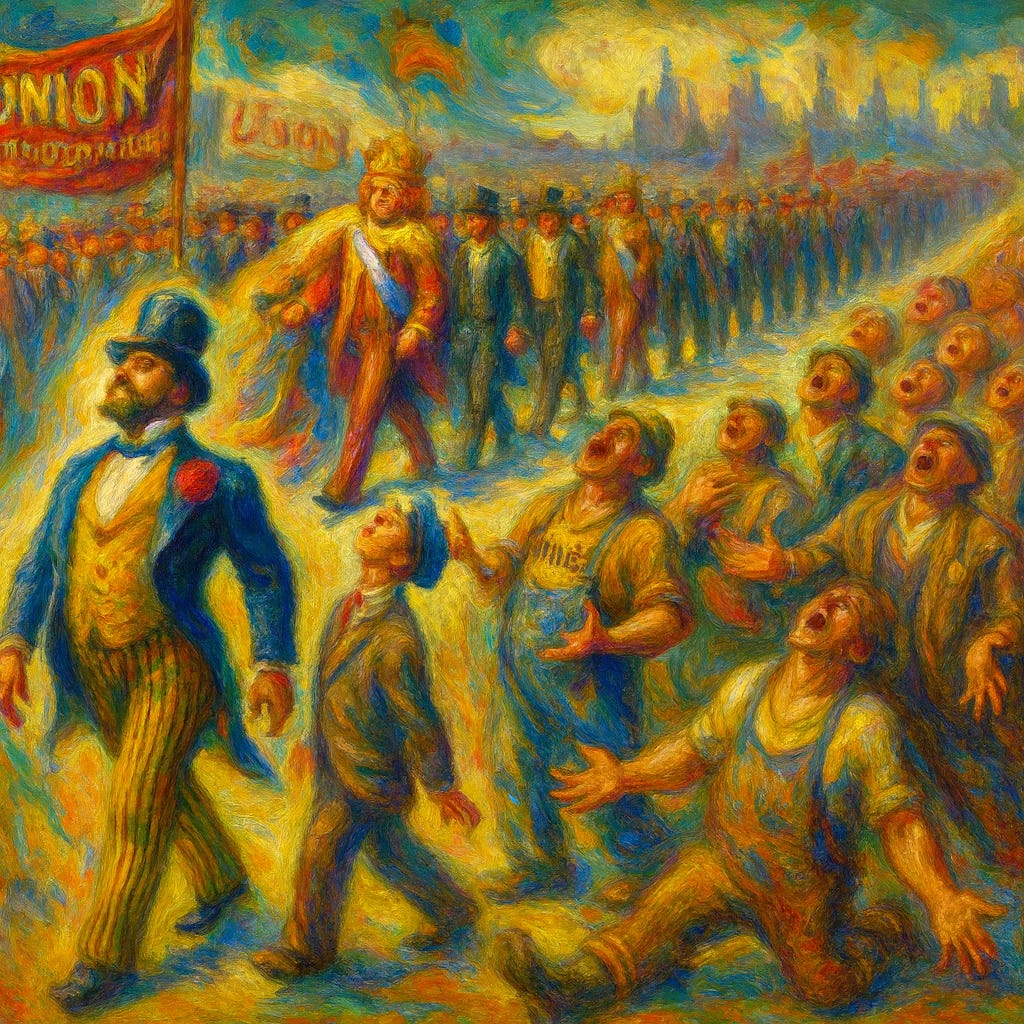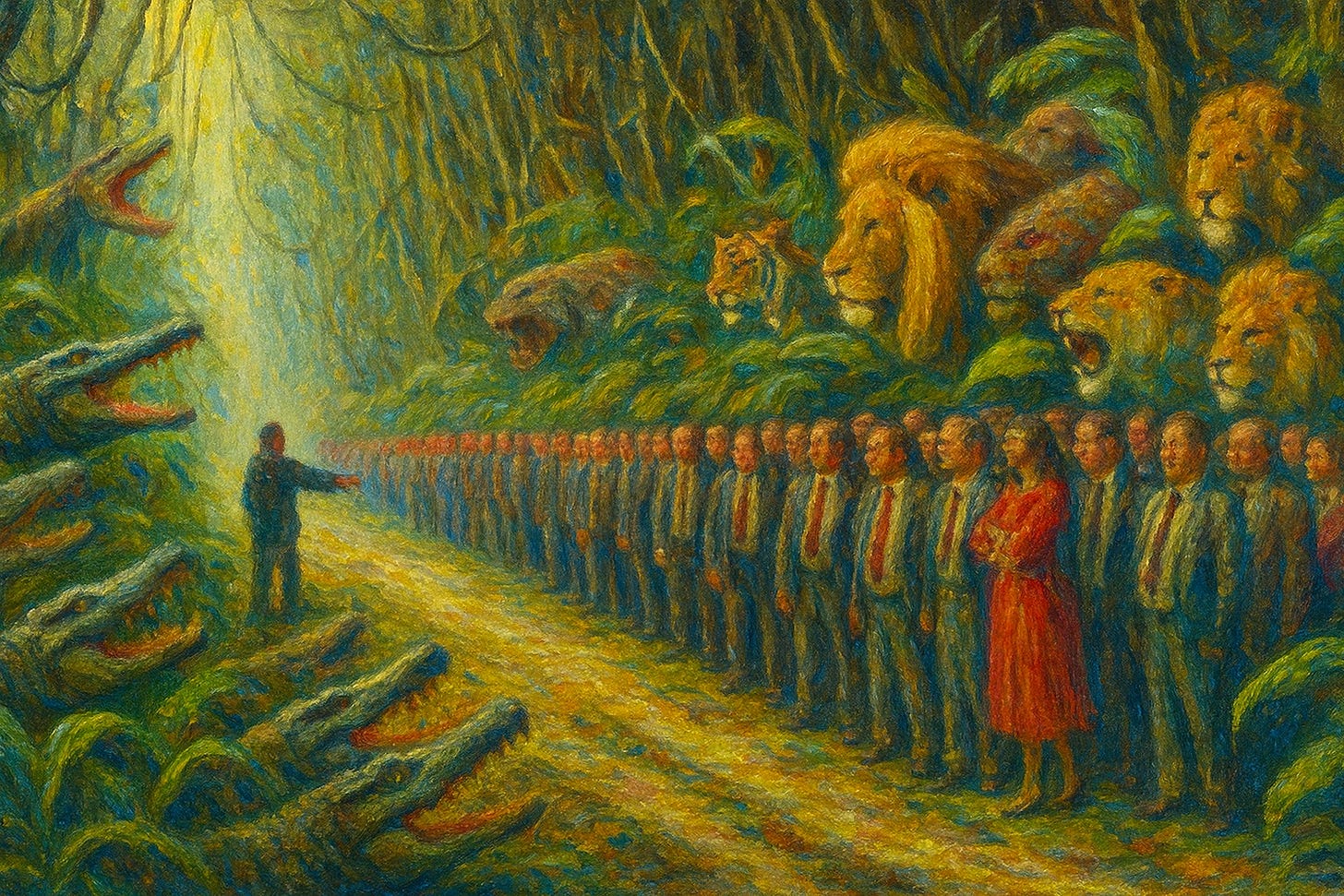The Jungle, Reforested
Callouses, Kangaroo Courts, and the Curious Case of the Disappearing Union Spine
If you believe in the importance of free speech, subscribe to support uncensored, fearless writing—the more people who pay, the more time I can devote to this.
Please subscribe to receive at least three pieces /essays per week with open comments. It’s $6 per month, less than USD 4. And now take 50% off.
Everyone says, "Hey, it’s just a cup of coffee," but please choose my coffee when you come to the Substack counter. Cheers.
Published on Oct. 16, 2024, revised August 6, 2025
As a child, I read The Jungle by Upton Sinclair.
It was not a novel so much as a shriek—an angry, fetid wail from the gut of the early 20th-century industrial machine. It told of abused workers, rats attacking babies in decrepit workers’ housing, and the stench of Chicago meatpacking plants that could make God Himself gag.
The moral was that only unions stood between the working man and the meat grinder. And I, like any idealistic young Canadian raised in the working-class crucible of Winnipeg, absorbed this lesson with the same earnestness that one might absorb scripture.
The Winnipeg General Strike of 1919 was local gospel. Though my ancestors were not unionised—they were Irish farmers, barely removed from peat bogs and colonial boot heels—I was no child of manicures or posh summer camp.
As a teen, my hands were blistered and blackened. Summers were spent wielding hammers, tossing mould-streaked bales of hay, and moving water-logged tyres off tarpaulins so cattle could be fed. A tire water cocktail is the only thing fouler than union politics, as I later discovered.
So let us dispense, at once, with any notion that I am some dainty capitalist lickspittle, anti-union because of yacht-club sentimentality—quite the contrary. My working-class bona fides could be notarised in callouses. My grandfather once had to borrow money for seed to plant his crop, so that was a cash-free summer, living on what they grew in the garden and the meat from a recently slaughtered cow.
We were not destitute by 1970s standards, but we sure wouldn’t qualify for brunch at today’s woke faculty club.
At my university, like almost everyone else, I stitched together a teaching career with duct tape and caffeine. We were all precarious. Ninety percent of the faculty were sessionals—academic sharecroppers.
I taught twenty courses a year and paid union dues twice over: both to OPSEU and CUPE. What did we get for our loyalty? The occasional email that no one read, and a meeting that no one attended. They were payroll deductions disguised as organisations. They were supposed to be prophylactics against justice.
Then came the real education.
Without warning or cause, I was suspended. No charges. No hearing. Banned from campus and ordered not to contact anyone associated with the university. Kafka would have had to sober up to write this properly. The logic? God only knows. Witnesses were anonymous. So was the alleged crime.
When I attempted to meet with the union—my union—I was followed by a security guard like some miscreant. The office was closed. Management filed a trespass order. They threatened me with arrest and a $10,000 fine: belts, suspenders, and a muzzle.
The union? Silent as a monastery after breakfast. Not an objection. Not a murmur. Just the gentle shuffle of paper as they filed me away.
A month later, through a human rights complaint, I learned the cause of my academic excommunication: I had offended a part-time Palestinian professor—who taught one course per year and whose name I had never heard before. I had told a stranger online that if you stand with Hamas, you stand with Nazis. This was too much for the algorithm, which delivered my statement to a student who had mistaken activism for a personality. She didn’t stop at outrage.
She manufactured slander, which senior faculty, students and management helped spread.
It was an attack right out of the Muslim Brotherhood playbook: isolate, defame, gag and attack. Management was actively abating criminal defamation.
The union, which would later fill the media with press releases when a pro-Palestinian worker was fired for espousing hate propaganda (a criminal violation in Canada, which of course she was not prosecuted for, Jews are fair game in Canada). When I was later fired for calling Hamas Nazis?
Not a peep from my loyal union brothers. One union, OPSEU, said in writing that it refused to represent me. But their public anti-Semitism and the numerous human rights complaints filed against them for anti-Semitism were simply coincidental. Sure, they were.
The part-time professor, it turned out, was bosom pals with our Vice Provost. She took over the complaint, turning it into a Stalinist show trial and removing his name to ensure it remained a generic administrative pogrom. She even took down her LinkedIN profile in a bid to hide her relationship with her co-accuser.
She became judge, jury, and ideological commissar. And the union?
Unaware—or uninterested—that a vice-provost using her office to crush dissent might be a teensy conflict of interest. Even a concussed chimpanzee could have spotted that one.
I still clung to the quaint notion that the union would help. After all, they were my only form of legal representation. Hiring a lawyer would’ve cost more than my gross annual wage after dues. But the union acted like I was radioactive. They refused meetings. They refused phone calls. Questions were met with exasperation. The university had lawyers and security goons making veiled threats. The union made hiding under desks their policy, a strategy lifted straight from 1950s nuclear drills. Duck, cover, and ignore your dues-paying member.
I expected outrage. I got eye rolls. CUPE filed one grievance, and it vanished like a parked car in a snowstorm. Follow-up questions were treated as harassment. Eventually, they made their strategy clear: “If you get fired, we’ll maybe file something. Until then, shut up and go away.”
When I threatened a bad-faith complaint, their indifference mutated into contempt. Not disinterest, mind you—contempt. They began actively obstructing and refusing to attend meetings, refusing to file anything, refusing even the decency of a call-back. I became my union, except without any of its rights. I read the policies, dug up the precedents, and spoon-fed them the law. They stared blankly like toddlers watching a TED Talk on tax reform.
I tried to make them see the full picture, the institutional rot, the slander, the politically motivated witch-hunt. But no one was ever listening. I was a hot potato. A problem child. A non-person. Every rep passed me off like a venereal disease. None ever read more than a paragraph of my documents. None were interested. None would meet in person. They were always at conferences, rallies, or—ironically—vacationing on the backs of the very dues they refused to honour.
They owed me, but treated my existence as a parasitic burden. Tens of thousands of dollars in dues down the toilet, and still I was regarded as an interloper. Not once did they say, “We’ve got your back.” Or, “How are you doing?”
It was more, “Why are you still here?”
When WSIB approved my PTSD claim—directly linked to harassment by management, faculty, and administration—the union deemed it unworthy of a harassment grievance. I had to cut and paste their own rules just to get them to acknowledge basic obligations. They would’ve left me bleeding on the factory floor if I hadn’t emailed them twice a week.
And yes, at some point, ideology reared its head. The head of CUPE, Fred Hahn, was publicly pro-Hamas and proudly hostile to Zionism. OPSEU was no different. These weren’t just inconvenient politics—they were the very ideological foundations of my persecution. My unions weren’t neutral. They were allied with my accusers. Their silence wasn’t incompetence. It was complicity.
Of course, they denied it mattered. Conflicts of interest, they said, were imaginary—like unicorns or ethical HR departments. But if conflicts don’t matter, why are they prohibited in every legal system since Hammurabi? If I can’t trust my legal representatives not to be in ideological bed with the ones trying to destroy my career, then representation is a lie.
It is high time unions were barred from political donations, or at least forced to disclose them in neon lights. How is a Jewish professor expected to trust a union that formally denounces Israel’s right to exist? Would a Black worker trust a union that denounced Black Lives Matter? Would a gay worker feel protected if their union waved a Westboro Baptist flag? Of course not. But in my case, I’m told to swallow the bile and say thank you for the representation I never received.
OPSEU refused to grieve on my behalf, and my representative admitted she had never read the collective agreement. But they control the process, and I am left yelling at a wall. I am expected to believe that their failure has nothing to do with politics, and that water isn’t wet.
Does my union have to post translated excerpts of Mein Kampf before I’m allowed to say anti-Semitism might be involved? Apparently, yes. That’s the level of moral illiteracy we’re dealing with.
And the rot is not just personal. At the macro level, this politicisation of unions chills every member. People self-censor. They keep quiet. They don’t post, don’t speak, don’t resist—because they know that if they need help, their union may very well hang them out to dry.
The unions assure us their activism does not affect representation. But the denial is insulting. Why would they admit it? They’re not just cowards; they’re either liars, zealots, or pathologically obtuse.
Sure, not every local is like this. But if your lawyer refused to talk, missed deadlines, and sympathised with your opponent, you’d fire them. With unions, you can’t. They’re hereditary autocracies. You don’t elect them—you catch them, like bedbugs in a discount motel union hall.
Meanwhile, management lies, manipulates, and strategises openly. A month before I was formally accused, they told others they planned to fire me. Due process was theatre—a Punch-and-Judy show for bureaucrats. The union either didn’t notice or didn’t care. Probably both. They were too afraid of management or too enamoured with the politics of my accusers to act.
So I lived under constant threat. The union, by omission or design, was indifferent to my fate. Grievances were missed. Violations of collective agreements, charter rights, and basic human dignity were ignored. The unions took the wrong turn at every juncture and whistled their way down the road singing La Marseillaise.
I thought unions were for workers. Now, they are a parody of their origins. Just as “free markets” became monopolistic fiefdoms, so too have unions become ideological clubs, staffed by apparatchiks and answerable to no one.
Let’s be clear: unions began as noble responses to horror. They fought for the eight-hour day, the weekend, health benefits, and humane conditions. They helped wrench dignity from the jaws of industrial cruelty. But power curdles—bureaucracy bloats. And mission drift is inevitable.
Today, union leaders see themselves not as worker representatives but as junior ministers in a progressive theocracy. They speak more about Palestine than pensions. Their press releases sound like sociology dissertations. Meanwhile, workers are left wondering if their dues fund contracts or causes.
The modern union suffers from Minimum Effort Syndrome. They do just enough to avoid lawsuits, just enough to pretend they care, just enough to avoid open revolt. But their heart isn’t in it. Why? Because doing the real work of representing members might offend their political friends. It’s easier to hold a protest than file a grievance. It’s easier to march for Gaza than stand up for Gary, who just got fired for a Facebook post.
Labour, to be taken seriously, must remember it’s not a branch office of the NDP, nor the angry Twitter feed of some tenure-drunk sociology department. A union’s mandate is to defend workers, not to audition for a seat at the woke table.
Whether it’s members read Marx, Milton Friedman, or nothing more complex than a hockey stat sheet, they are owed equal representation. The moment a union starts vetting its solidarity by political alignment, it ceases to be a labour movement. It becomes just another boutique activism club—self-righteous, exclusionary, and useless to those who work for a living.
Or, if they insist on being partisan, there must be mechanisms in place for neutral legal representation.
No Jewish academic should be forced to rely on a union that openly supports the ideology seeking Israel’s destruction. In my case, I should never have been trapped in a system where my only available advocates were politically aligned with the inquisitors trying to ruin me.
You can’t de-politicise unions entirely, but you can create accountability. I ran my case through analysis software. Dozens of missed grievances. Unfiled violations. Shocking oversight. I should have had twenty active grievances. I had one.
And through it all, the union acted like a vindictive child. At one point, OPSEU violated my privacy and forwarded my complaint to the very person I was complaining about. She withdrew my grievances out of spite. This is not just unethical. It is clinical-grade dysfunction.
My livelihood, health, and future have been mangled by an organisation I cannot opt out of, that steals my wages, refuses to communicate, and defends its corruption. Management, seeing this cowardice, escalates its savagery.
Representation must be codified. Expectations must be enforceable. Bad faith must carry real penalties. There must be meaningful appeal mechanisms. There must be independent bodies. There must be justice.
Unions must be forced to choose: serve the worker or serve the cause. They can no longer pretend to do both. What we have now is a jungle—no longer of rats and spoiled meat, but of spineless reps, ideological zealotry, and bureaucratic cowardice.
And in this new jungle, the unions are not clearing the brush. They are planting trees.
They are not the solution. They are part of the problem.
If you found value in this article and wish to support my ongoing work, especially during my 18-month suspension, please consider leaving a tip. Your support helps me continue producing uncensored content on critical issues.









"For eleven months, I have tried to spur them to listen, care, and take action, but they consider my questions harassment; the strategy they finally said was, 'If you are fired, we will grieve it, shut up and go away.'"
Now I know why so many school boards "suspend teachers pending an investigation" -- if they fired the teacher outright, then the union would be forced to get involved, and neither the boards nor the unions want that -- it would mean less time at Pro-Hamas rallies. This way, the teacher/instructor is effectively eliminated and no one has to do anything; it's all perfectly anonymous and opaque, and there is no recourse.
Depressing. Do we need to form a meta-union whose job it is to convince the union to do its job of representing us?! Am I imagining it, or are our unions now the pigs at the dinner table in the gut-wrenching closing scene of Orwell's "Animal Farm"?
If ever there was a union that deserves the treatment that the Air Traffic Controllers Union got from Reagan (I.e., you’re all back at work Monday morning or you are fired), it is OPSEU. And CUPE, CUPW, as well as the various teachers unions. Even the leftist hero FDR thought that allowing government employees to unionize was a really bad idea.